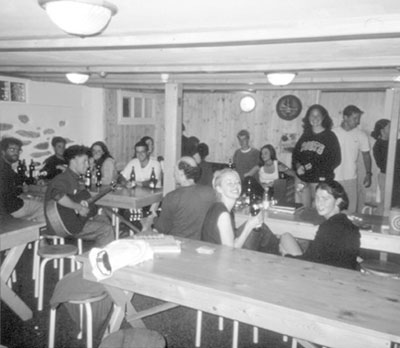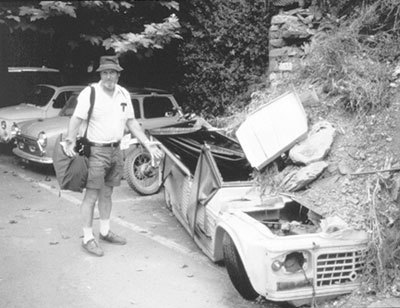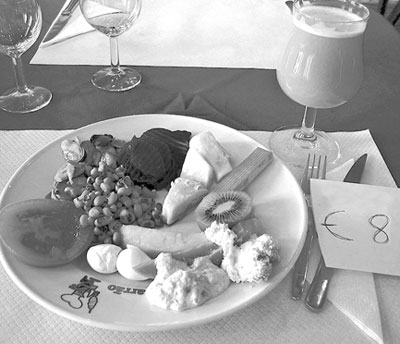Smart travel makes more sense than ever
Sure, the dollar is down, but your interest in Europe is up. You can still take your dream trip if you know how to make the most of your dollars and sense. Here are my top tips for stretching money.
Flights
• Europe’s highly competitive no-frills airlines — such as Ryanair and easyJet — can often get you from one city to another faster and cheaper than the train. You can book on the Web or by phone. Beware, though; cheap airlines often use small airports located far from town, which can cost a little extra time and money.
Car rental
• To save money, arrange your car rental from the States rather than in Europe. If you need a car for three weeks or more, it’s cheapest to lease. Otherwise, rent by the week with unlimited mileage.
• Drivers should get Collision Damage Waiver (CDW) insurance to cover the car’s full value in case of an accident. If you pay for CDW insurance at the car rental agency in Europe when you pick up your car, it’ll cost you up to $25 a day. Ask your credit card company if it covers CDW (if you rent the car using that card). Alternatively, you can get it beforehand in the States through Travel Guard for $7 a day; it’s accepted throughout Europe except for Ireland and Italy.
• Cars are worthless and expensive headaches in big cities. Pick up your rental car after the first big city you visit and drop it off before the final big city of your trip. Paying $20 a day to store a $50-a-day car while touring a city is a pricey mistake.
Trains
• Know the bonuses that come with railpasses. For instance, Eurailpasses cover certain international boat crossings (e.g., Italy-Greece and Sweden-Finland) and cruises on Germany’s Rhine River and Switzerland’s lakes. Your railpass can also get you significant discounts on the Eurostar Chunnel, the Ireland-France ferry and Germany’s Romantic Road bus.
• Take an overnight train to avoid the cost of a hotel and save a day in your itinerary. You have three sleeping options: a free airplane-style seat, a couchette (a bed in a 6-person compartment for $20) or a sleeper (a bed in a compartment with a double bunk for $80). Trade away the sleeper privacy for a couchette and save $60.
Money and shopping
• Use ATMs rather than travelers’ checks. You’ll get your cash cheaper and faster. While ATMs give the best-possible rates, they do come with transaction fees. Minimize these by making fewer and larger withdrawals. Store the cash safely in your money belt.
• In any transaction, understand all fees and expenses. Ask to have bills itemized. Assume you’ll be shortchanged. Always ask how much. Do your own arithmetic and don’t let the cashier rush you. Smile, but be savvy.
• Take advantage of department stores anywhere in Europe for cheap folk art, souvenirs, postcards and inexpensive cafeterias.
Phoning
• Stay in touch cheaply by dialing direct to loved ones back home. International phone cards with PIN numbers are sold at newsstands throughout Europe. They offer calls to the U.S. for 10 cents a minute — a huge savings over the $3-a-minute rates offered by the big American services.
Sleeping
• Europe’s 2,000 hostels offer countless cheap dorm beds. A hostel membership pays for itself in four nights. And it’s not limited to youths. In fact, those over 55 get a discount on a hostel card. Using the hostel’s kitchen, you can cook for the price of groceries — a great savings for traveling families. Try www.hihostels.com for the official ones that require membership or www.hostels.com for independent hostels.
• Throughout Europe, budget chain hotels rent reasonably priced rooms. The huge Accor chain offers a range of hotels, from the cheap Formule 1 Hotels (mostly in France) to the mid-range Ibis Hotels (sterile, throughout Europe) to the pricier, cushier Mercure and Novotel hotels (for all Accor Hotels, see www.accorhotels.com or, in the U.S., call 800/221-4542). Britain has Travelodge, Travel Inn and Premier Lodge. For Ireland, it’s Jurys Doyle Hotels.
• Ask for a deal on your hotel room. You’ll have the best chance of getting a discount if business is slow. It helps if you go direct (a room-finding service costs the hotel a booking fee), offer to pay in cash or stay at least three nights.
Eating
• Every country has early-bird and “Blue Plate” specials. Know the lingo, learn your options and you can dine well with savvy locals anywhere in Europe for under $10.
• To save money in restaurants, couples can order a side salad and split an entrée. To save more, request tap water instead of mineral water, drink the house wine and skip desserts.
• Locals wanting restaurant-quality food at half the price get hot food to go at delis. Enjoy good cuisine at fast-food prices with a carefully chosen picnic perch for dinner.



